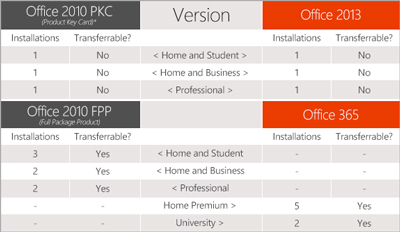News
Microsoft Explains Office 2013's Single-PC Licensing Limitation (UPDATE)
- By Kurt Mackie
- February 21, 2013
Consumers and small business users who purchase Office 2013 are permitted just "one installation" under the new suite's licensing plan, Microsoft explained this week.
UPDATE: Microsoft changed course in an announcement on March 6 and relaxed the transfer restrictions described in the rest of this article. Office 2013 buyers get the rights to make just one installation of Office 2013 on a single machine and they have no transfer rights to another machine -- meaning, it is not permissible to install a copy on a PC and make another copy onto a laptop, according to Microsoft. That's true for those buying Office 2013 Home and Student, Office 2013 Home and Business, or Office 2013 Professional editions through retail or OEM outlets.
There is one exception: It's possible to transfer Office 2013 installations to another PC if there's an equipment failure and the machine gets replaced under warrantee, according to a Microsoft announcement (see Microsoft's chart below).

[Click on image for larger view.] |
| Office 2010, Office 2013 and Office 365 transfer rights. (Source: Microsoft) |
While most consumers might think of boxed Office copies as being sold in just one form, Microsoft had offered two product forms with Office 2010 -- a "product key card" (PKI) version with no transfer rights and a "full package product" (FPP) version that had transfer rights. Those two versions of Office 2010 were sold at different prices. In contrast to consumers, organizations may typically purchase Office through Microsoft's volume licensing, which costs more, but this blog claims that organizations get more too, mostly in terms of licensing and use options.
It seems it's now difficult to find the FPP version of Office 2010 at online shopping sites. There apparently isn't an Office 2013 FPP version at all, and that seems to have caused some consternation. Office users wanting those PC transfer rights either have to hunt down a boxed retail copy of Office 2010 or subscribe to certain editions of Office through "Office 365," which is Microsoft's branding for its online services. (Note that the Office versions sold through Office 365 are not delivered as a service over the Web. They still must be installed on a machine by the end user, despite the association with Microsoft's services.)
In contrast to Office 2013 for consumer users, those who subscribe to Office 365 Home Premium or Office 365 University can install up to five or up to two installations of Office, respectively, on their PCs. These Office 365 subscribers also have the rights to transfer the software to other machines. The transfer involves a deactivation and activation process using a Windows account. The catch for Office 365 users is that their subscription is not a "perpetual license," as afforded by boxed Office 2013 copies. That means that if an Office 365 subscriber stops paying for the subscription, then that person loses the rights to run the software. Perpetual licenses, on the other hand, never expire, so users can always run the software.
Microsoft rolled out its subscription-based Office 365 offerings to consumers in late January for the first time. That novel way of selling Office has perhaps made some consumers scratch their heads about which course to take. Office 365 suites are routinely updated as part of the service, which is a benefit, but it comes at a cost -- namely, another monthly recurring expense in an age of flat wages. If Office 2013 is purchased, then that's a perpetual license, with no recurring monthly fees, but that copy legally can be used only for the life of that one single PC.
Microsoft's announcement somewhat defensively claims that the Office 2013 restriction of a single copy on a single machine was also an option back with Office 2010, and people preferred that PKC option (one copy/one PC) over the FPP option (transfer rights).
"It is important to note that Office 2013 suites have consistent rights and restrictions regarding transferability as the equivalent Office 2010 PKC, which was chosen by a majority of Office 2010 customers worldwide," Microsoft's announcement states.
Of course, the majority of consumers tend to buy the lower priced product. That circumstance likely will remain true in the current stagnant economy. Some alternatives for consumers include using the free Google Docs browser-based service or Microsoft's free browser-based Office Web Apps. Access to Office Web Apps happens by signing up to use Microsoft's SkyDrive storage service, or an Outlook.com e-mail account (formerly known as "Hotmail"), or the Facebook Docs.com.
Free installable productivity suites include LibreOffice, which is a branch project from OpenOffice.org. OpenOffice.org is now an Apache incubator project after a short-lived stewardship under Oracle following its purchase of Sun Microsystems. A list of Office-like productivity suites can be found at this Wikipedia page.
Microsoft's license agreements used to be known as "end user license agreements" or "EULAs." However, this Microsoft blog post claims that they are now called "Microsoft Software License Terms" or "MSLTs." For those wanting to dig into some legalese, it's possible to search for specific MSLTs on any Microsoft product by using this Microsoft search page.